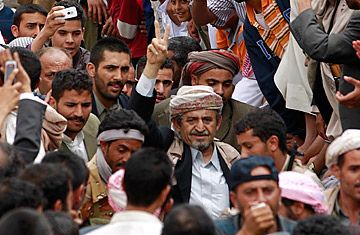
Tribal leader Sadeq al-Ahmar flashes a victory sign as he attends a mass funeral for fighters loyal to him in Sanaa May 27, 2011.
Residents of Yemen's capital Sana'a awoke on Tuesday to a dawn chorus of bird song and machine-gun fire. An uneasy truce between rebel tribesmen and loyalist troops had prevailed over the weekend. But now the two sides were back at it, launching shells at each other as windows rattled across the city and plumes of dark smoke rose into the crystal blue sky.
Despite four months of mass protests and defections from within his army, party and tribe, President Ali Abdullah Saleh has remained defiantly in place, seing off one effort to oust him after the next, while all the time maintaining that he is the pole who holds up the tent. Shortly after snubbing a third attempt at mediation by Gulf Arab neighbours last Sunday, Saleh sent his forces to take on the leaders of Yemen's most powerful tribal organization, the Hashed, the leaders of which have been bankrolling the opposition and supporting the upkeep of hundreds of thousands of protesters camping out on the capital's streets.
It was a dangerous fight to pick. The week's worth of gun battles between the rebel tribesmen and Saleh's troops has already claimed the lives of 150 people; and the confrontations are briskly fanning the fears of civil war. The two sides, now separated only by a few residential blocks, are firing anti-aircraft missiles at each other as they scramble for control of government buildings and the airport, their battle slowly encroaching the center of the city.
Life in the capital is growing fierce and desperate. Sana'a's eastern suburb of Hasaba — the crux of the clashes so far — is now a ghost-town where Kalashnikov-wielding tribesmen in camouflage stalk streets empty of all humanity except for a few dazed looking old men sitting in the dust oblivious to the bullets and rockets flying around them.
The violence in Hasaba has spread panic throughout the city. Long lines of cars and buses with bags strapped to the roofs filtered their way out of the city on Tuesday. Many of those staying put are hoarding, withdrawing their savings from banks, filling buckets with petrol and barricading themselves indoors. "No safety, no electricity, no water, no phone network, and people with no jobs, the situation is very bad these days," says Ahmed Zaid, a man from old Sana'a who scratches a living by ferrying people to Tagheer Square, the epicenter of the protests, on his battered Suzuki motorbike. "I myself I'm terrified for my family, we're leaving tomorrow, inshallah," he says in broken English and using the Arabic for "God willing."
The rebel tribesmen are holed up in a bullet-pocked gothic-style mansion belonging to Sadeq al-Ahmar, the grizzly-bearded leader of the Hashed, Yemen's largest and most powerful tribal federation. Sadeq's men are gradually fanning out and now have control of several government buildings including the ministry of trade and interior. "This started as self-defense but now we're fighting for his downfall," says Sheikh Mohammed al-Farasi, a scrawny man with bloodshot eyes guarding the entrance to Ahmar's crumbling garrison which is stocked with ammunition and supplies."There's no bigger shame for a tribal leader than having his house attacked. The only way this can end is if Saleh goes, the Hashed have spoken: enough is enough," he says loading his AK-47 with cartridges.
On Wednesday, the jostling for buildings continued. Special Police Units recaptured the Ministry of Local Affairs from the Ahmar clan, while the latter took Hasaba's police station. At least 37 people died in the clashes on Tuesday night bringing the overall death toll from this latest round of fighting to over 200.
Sadeq, one of the wealthiest and most outspoken figures on the Yemeni tribal landscape, had been allied with Saleh until March when he announced his support for the "peaceful youth movement". Now he's being looked on as the power that might unsettle Saleh from his perch. Sadeq's brother Hamid, a business tycoon and founder of the opposition party Islah, has positioned himself as a potential successor to Saleh and accuses the president of violating the constitution by turning Yemen into his family enterprise. Saleh has ordered Sadeq's arrest but the tribal chief remains defiant. Last week he called Saleh a "liar" and said the President would leave the country "barefoot."
